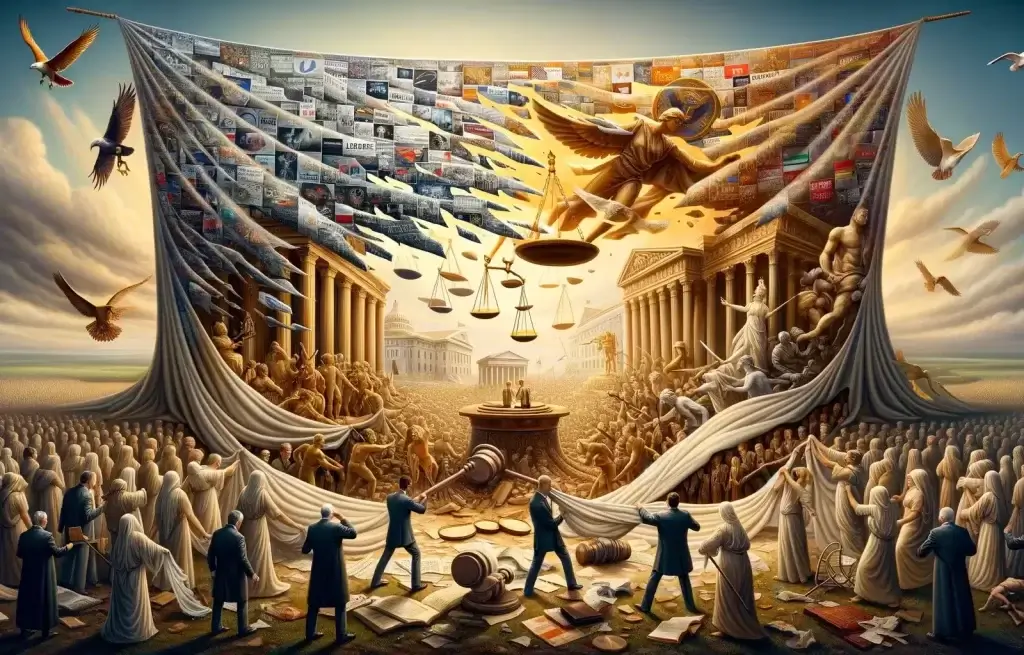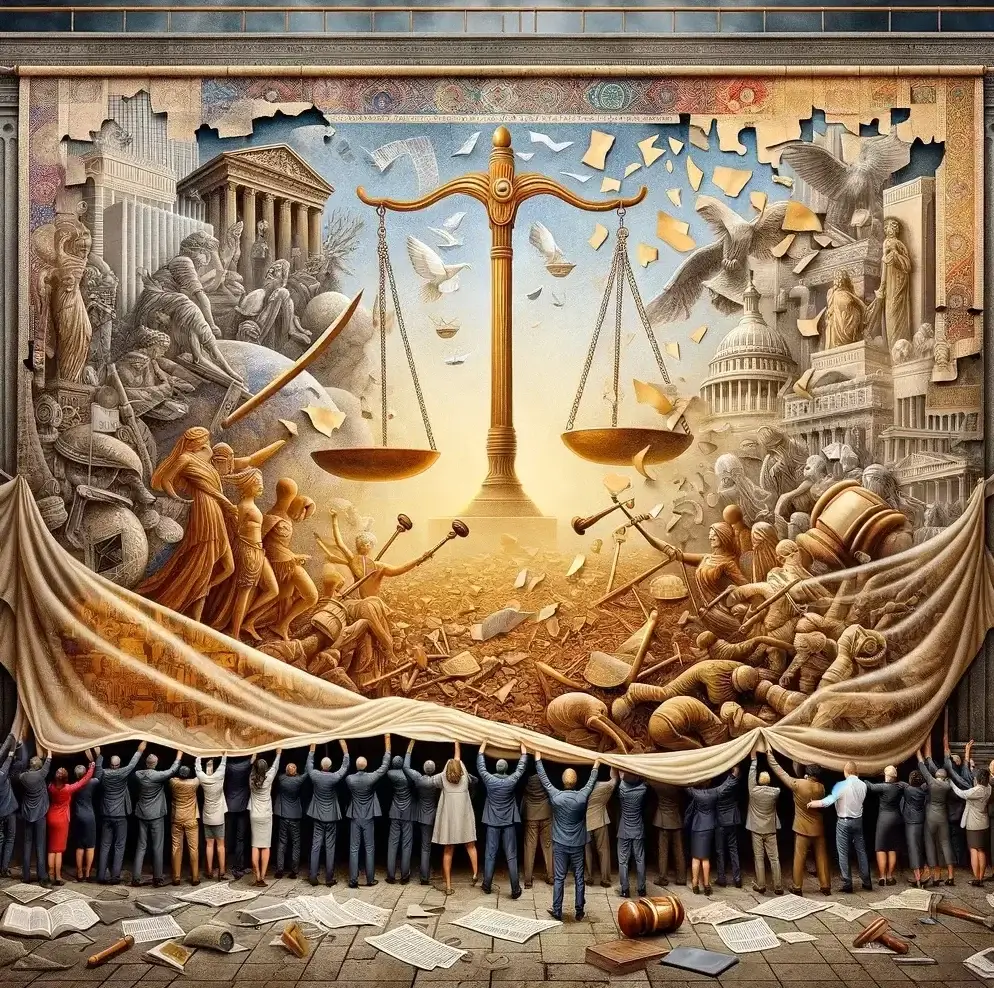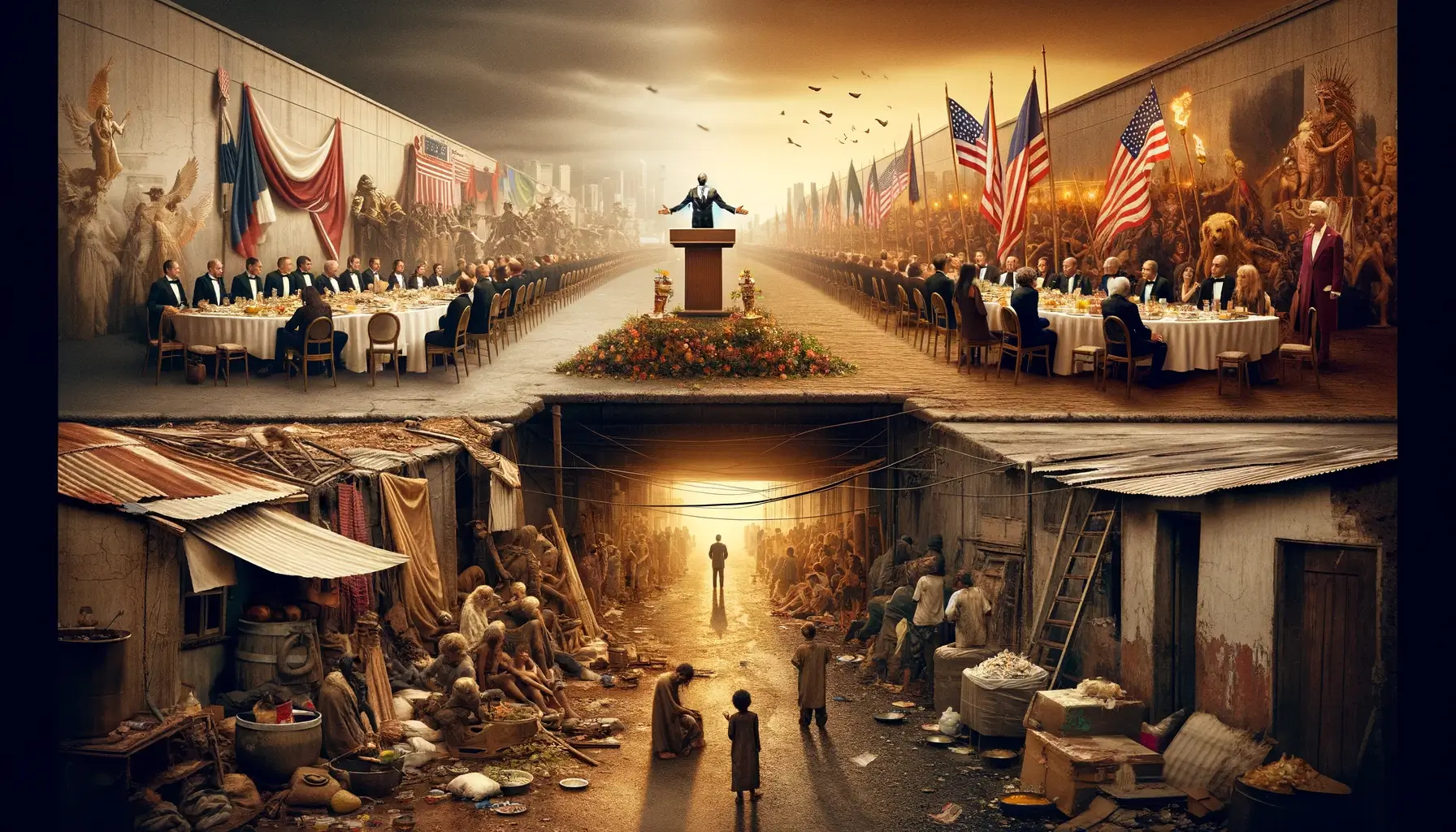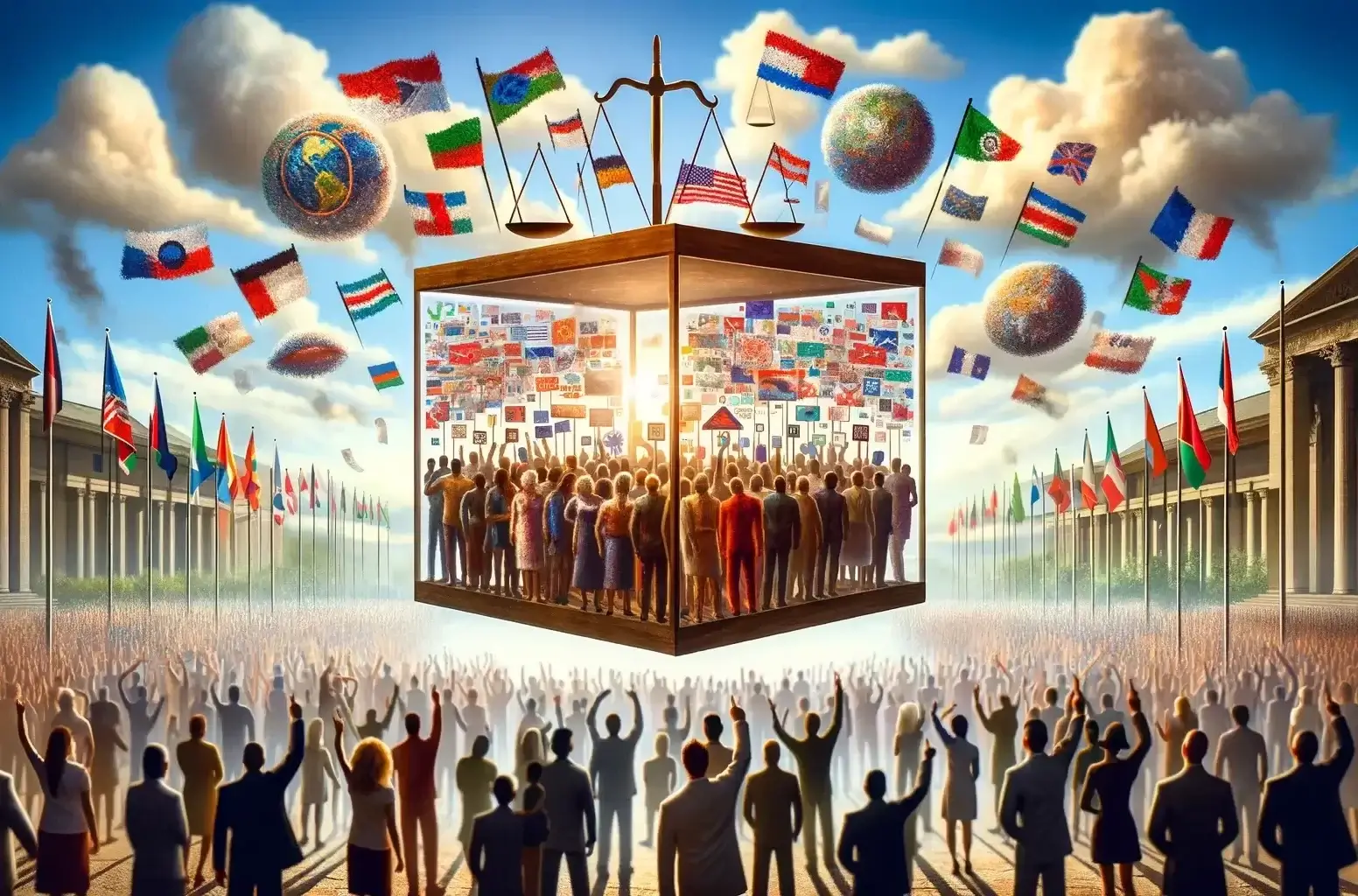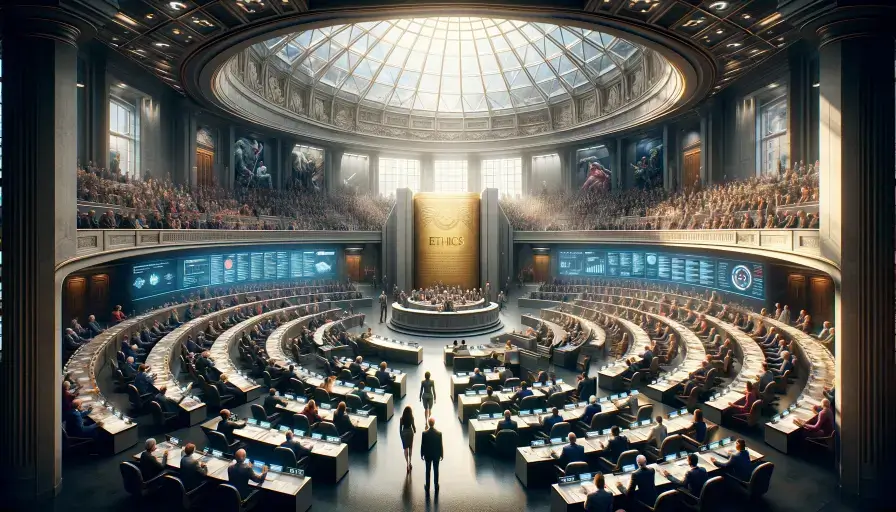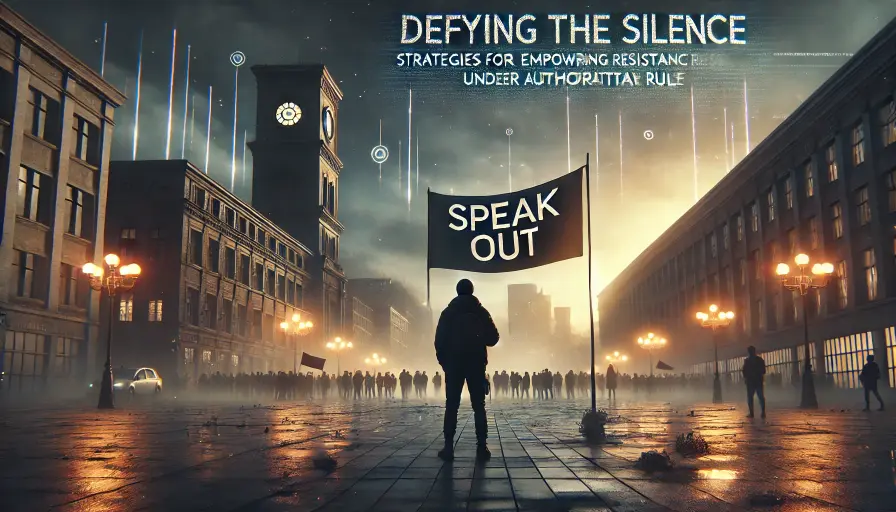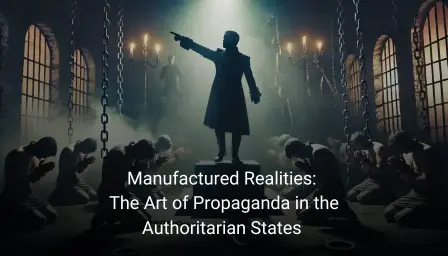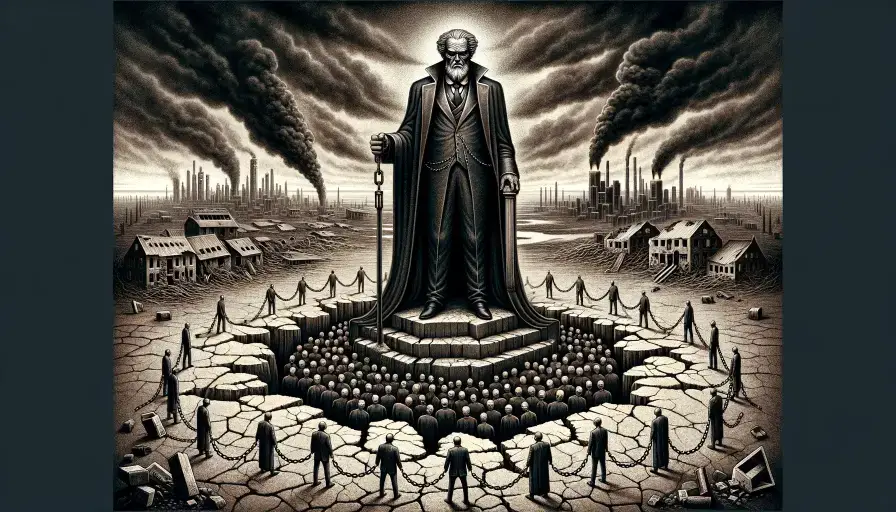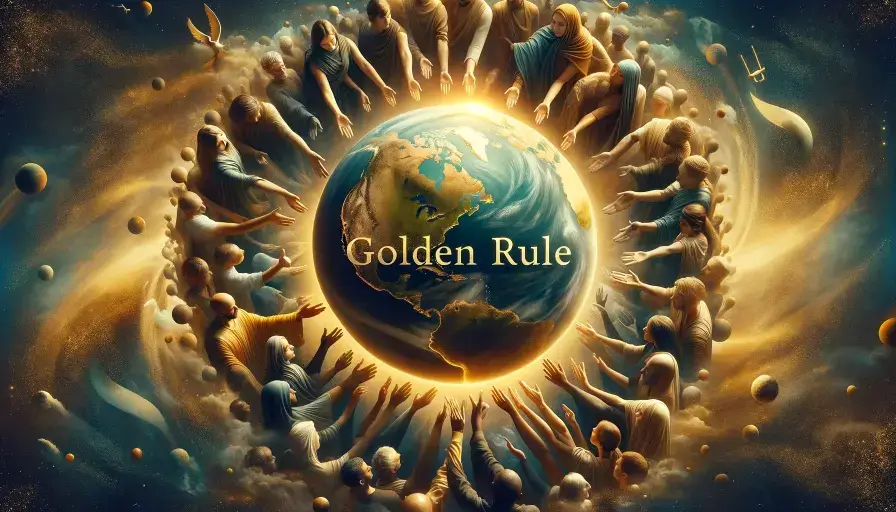Introduction:
In the intricate tapestry of politics, the concept of political double standards has long been a contentious issue, casting a shadow over the integrity of democratic processes.
Political double standards refer to applying different principles or rules to similar situations, often influenced by partisan politics and ideological biases.
This phenomenon erodes public trust and credibility in governing institutions and undermines the fundamental tenets of fairness and equity that form the bedrock of a just society.
The prevalence of political double standards in contemporary societies undeniably transcends geographical boundaries and political ideologies.
From the highest echelons of government to the grassroots level, hypocrisy and unequal treatment have become familiar, fueling public perceptions of a system plagued by moral relativism and a lack of accountability.
We seek to unveil this veil of duplicity, shedding light on the complexities and far-reaching implications of political double standards.
Understanding Political Double Standards
To comprehend the depth of this issue, we must first define what constitutes a political double standard. It refers to applying different rules, standards, or principles to similar situations or individuals, often based on partisan affiliations, personal interests, or preconceived notions.
In the earliest civilizations, those in power often exercised selective enforcement of laws and policies to maintain dominance, setting the historical context for political double standards.
However, the advent of modern democracy and the principles of equality and justice have brought these double standards into sharper focus, highlighting the inconsistencies and contradictions that undermine the very fabric of representative governance.
Sociologists understand double standards as a manifestation of deeply ingrained social norms and power dynamics. Perceptions of certain groups or individuals as inherently superior or inferior often lead to their emergence, resulting in differential treatment and perpetuation of inequalities.
The historical double standard regarding gender roles, which imposed different expectations and opportunities on men and women based on societal conventions, serves as a classic example.
Manifestations of Political Double Standards
Political double standards can take various forms and manifest themselves in diverse contexts.
Historical examples abound, ranging from the colonial double standards applied by European powers to their subjugated territories to the racial double standards that underpinned segregationist policies in many nations.
Contemporary politics is not immune to this phenomenon, with populist double standards being a notable example. Populist politicians often employ double standards to garner support from their base while vilifying others.
They portray themselves as champions of the people while selectively applying rules and principles to suit their agenda.
The political arena also perpetuates cultural and racial double standards, subjecting groups to harsher scrutiny, stricter regulations, or differential treatment based on their ethnicity or cultural background.
This perpetuates marginalization and undermines the principles of equal representation and social justice.
The Mass Media’s Role
The mass media and journalism play a pivotal role in shaping public perception and discourse surrounding political double standards. Investigative journalism and critical analysis can expose double standards, hold those in power accountable, and foster transparency.
However, biased or sensationalized media coverage can inadvertently reinforce and perpetuate double standards, amplifying polarization and ideological divides.
The media must maintain a high standard of ethical journalism, challenging double standards without falling prey to their own biases or succumbing to external influences.
The public can only make informed decisions and hold their leaders accountable for any instances of hypocrisy or unequal treatment through balanced and objective reporting.
The Consequences of Double Standards on Credibility
The pervasiveness of political double standards has far-reaching consequences, particularly regarding the credibility of political institutions and the trust they command from the electorate.
Perceived double standards foster skepticism and disillusionment among citizens, leading them to perceive the political system as flawed and lacking integrity.
This erosion of public trust can have severe repercussions, including low voter turnout, decreased civic engagement, and a general sense of alienation from the democratic process.
Moreover, political double standards can undermine the legitimacy of governing bodies and their decisions, potentially leading to civil unrest or challenges to the established order.
Let’s imagine that the public perceives selective application of laws and policies or preferential treatment of certain groups. In that case, it can fuel resentment and undermine the very foundations of the social contract.
Case Studies
Case1: Human Right
Let us examine a specific case study, the United States foreign policy regarding human rights violations, to illustrate the complexities and nuances of political double standards.
Despite the U.S.’s global positioning as a champion of human rights and democracy, people often perceive its actions as inconsistent and subject to double standards.
For instance, critics have criticized the U.S. for its unwavering support of authoritarian regimes that violate human rights, like Saudi Arabia, while imposing sanctions and diplomatic pressure on other nations for similar transgressions.
This perceived double standard has been a source of contention, with critics arguing that it undermines the credibility of the U.S.’s commitment to human rights and weakens its moral authority on the international stage.
The broader implications of this case study extend beyond foreign policy, as it highlights the potential consequences of political double standards on a global scale.
The perception of powerful nations applying different standards to different countries can foster mistrust, undermine international cooperation, and strain diplomatic relations.
Case 2: International Law
U.S. Positions on the Gaza Conflict vs. Other Wars
The United States’ response to the latest flare-up of violence between Israel and Palestinian militant groups in Gaza has drawn accusations of double standards from critics.
While condemning the rocket attacks from Gaza, the U.S. firmly backed Israel’s right to defend itself and did not criticize Israeli airstrikes that caused civilian casualties.
In contrast, the U.S. has taken a much harsher stance against Russian military operations in Ukraine and the Syrian government’s attacks in its civil war, which also caused civilian deaths. This divergence in America’s positioning has reignited charges of partisan double standards in its foreign policy.
Some argue that the U.S. applies different standards based on its strategic interests and relationship with Israel as a close ally. Others point to the influence of domestic political considerations, with some U.S. lawmakers mindful of not alienating pro-Israel constituencies.
This alleged inconsistency emphasizes the multiple impacts of double standards:
Erosion of Moral Authority
When the U.S. fails to uphold principles consistently, it diminishes its ability to serve as an example and moral voice. This can enable human rights abuses worldwide.
Strains Relations with Other Allies
Some European and Arab allies perceive the U.S. position as disproportionately favoring Israel, straining relations, and efforts to forge a unified policy.
Perpetuates Grievances
For Palestinians and others in the Muslim world, the double standard feeds a narrative of injustice and resentment toward the U.S., inflaming existing tensions.
Extremist groups can exploit the perceived double standard in the Israeli-Palestinian conflict to undermine American intentions and values despite its complexity. It demonstrates how inconsistent policies can undermine strategic interests and fuel instability.
The perceived U.S. double standard in Gaza compared to previous wars has significant effects.
| Repercussion | Description |
| Undermines International Law | Unwavering U.S. support for Israeli actions despite potential violations of international laws and norms weakens the entire framework of international law and institutions like the ICC and UN. |
| Radicalized Public Opinion | The double standard risks radicalizing public opinion in the Muslim world against the U.S., feeding perceptions of hypocrisy and injustice that can aid extremist recruitment. |
| Complicates Future Mediation | By being seen as partisan, the U.S.’s ability to be an honest broker and mediator in future Israeli-Palestinian peace negotiations is severely undermined. |
| Impacts Domestic Credibility | The contrasting positions on Gaza versus condemnation of Russian actions can be seen as a double standard by the American public, eroding faith in the government’s moral authority. |
| Enables Human Rights Abuses | Failing to condemn actions that violate human rights consistently provides cover and tacit approval for continuing such abuses by other nations or groups. |
| Strains Relations with Allies | Some U.S. allies perceive the position as disproportionately favoring Israel, straining relations, and efforts at forging a unified policy. |
| Perpetuates Grievances | For Palestinians and others, the double standard feeds a narrative of injustice and resentment toward the U.S., enflaming existing tensions. |
The table highlights how the perceived application of double standards, even by a significant power like the U.S., can have severely corrosive impacts across multiple dimensions—undermining international laws, catalyzing extremism, hampering peace efforts, reducing moral authority, and straining alliances.
Moral Double Standards
Moral double standards apply different ethical principles or standards to other situations or individuals and are often inextricably linked to political double standards.
This phenomenon can stem from various factors, including ethical relativism, in which moral judgments are based on context or circumstances rather than universal principles.
We cannot understate the role of ideology in shaping moral double standards. Individuals or groups may justify different moral standards based on their ideological leanings, rationalizing actions or policies that align with their beliefs while condemning those that contradict them.
In the modern era, societal values and norms have also impacted what constitutes a double standard in morality.
We now view issues once taboo or unacceptable through a more nuanced lens, and new ethical dilemmas emerge, challenging traditional moral frameworks.
Psychological and Social Dimensions
Understanding the psychological and social dimensions of political double standards is crucial to effectively addressing this issue. At an individual level, the question arises: Can a person genuinely embody double standards, or are they merely a reflection of broader societal biases?
Cognitive biases, such as confirmation bias and in-group favoritism, play a significant role in forming and perpetuating double standards.
These biases can cause people to favor those they perceive as belonging to their group while selectively seeking and interpreting information confirming their preexisting beliefs.
Social Identity Theory suggests that individuals derive a sense of self-worth and belonging from their group affiliations, which can influence their perception and application of double standards.
People may be more inclined to uphold favorable standards for their in-group while applying stricter or harsher standards to out-groups, perpetuating a cycle of discrimination and inequality.
Problems and Perceptions
The issue of political double standards is multifaceted, with various intersecting factors contributing to its perpetuation.
One area of concern is the treatment of different ethnic and religious groups in the political sphere, where double standards can manifest in the form of discriminatory policies, biased law enforcement, or differential access to resources and opportunities.
The concept of intersectionality is equally pertinent when analyzing political double standards. People may experience intersecting kinds of discrimination and uneven treatment based on their gender, color, class, and other aspects of their identity, which can intensify the effects of double standards.
Moreover, the harmful effects of double standards extend beyond the political realm, permeating societal attitudes and norms.
They can reinforce stereotypes, exacerbate existing inequalities, and foster an environment of mistrust and division, ultimately undermining the principles of social cohesion and inclusivity.
Public opinion and political double-standard perceptions matter.
Recent polls have provided insights that offer context for public opinion and perceptions of political double standards. These findings include the following:
- Perceptions of Leadership and Age:
A notable aspect of public opinion relevant to political double standards is the perception of age in leadership. Recent polls indicate that most Americans believe current and past presidents like Biden and Trump are too old to serve another term.
This sentiment was shared across party lines with variations, implying a common standard applied to the leaders irrespective of their political affiliation (https://www.ipsos.com/en-us/latest-us-opinion-polls).
- Views on Political Trials and Accountability:
The public’s stance on holding leaders accountable before elections reflects a certain standard. Many Americans expressed that they believe a federal trial concerning Donald Trump’s actions related to the 2020 election should occur before the next presidential election, reflecting a desire for accountability in political processes.
(Politico Magazine/Ipsos Poll)
- Attitudes Towards Military Aid:
In the international context, Americans are divided on the issue of continuing military aid to Israel, which reflects a double standard in foreign policy preferences among different political affiliations.
Most Republicans were in favor, whereas most Democrats and independents were less likely to support a candidate who continued such aid. (Reuters/Ipsos Poll)
- Shifts in Trust:
Trust in the U.S. Supreme Court has decreased among young Americans, and trust varies significantly by political affiliation, with a current 20-point divide between Democrat and Republican trust levels.
Partisan perspectives may influence perceptions of institutional fairness, revealing a double standard for evaluating institutions based on aligning their decisions with party lines.
(https://www.ipsos.com/en-us/latest-us-opinion-polls).
- Police Trust:
Young Americans’ trust in police and military institutions diverges, with notable differences along racial and ethnic lines. Such differences may suggest a perception of double standards in how communities experience and judge law enforcement and military institutions.
(https://www.ipsos.com/en-us/latest-us-opinion-polls).
- Concerns on Homelessness and Housing:
Young Americans broadly believe homelessness can affect anyone and show a preference for owning a home, though this ideal varies across racial groups.
Significant housing developments are also highly desired, yet comfort levels vary across racial and urban-rural divides, indicating varying standards in the perception and resolution of housing issues.
(https://www.ipsos.com/en-us/latest-us-opinion-polls).
- Opinions on Voting Policies:
There is strong support among young Americans for policies that make voting more accessible, like automatic voter registration, and opposition to removing polling places from college campuses, reflecting a standard favoring accessible voting. (https://www.ipsos.com/en-us/latest-us-opinion-polls).
These public opinion points underscore that while some standards are applied universally, others vary based on political, demographic, or ideological lines, revealing complexities in how the concept of double standards is manifested in contemporary society.
Essential aspects of double standards in international relations:
| Impact | Description |
| Erosion of Trust and Credibility | Double standards breed mistrust and skepticism, damaging diplomatic ties and cooperation between nations. The credibility of the country applying double standards is diminished. |
| Strains on Diplomatic Relations | Perceived unfair treatment makes it difficult for nations to engage constructively, poisoning the environment for negotiations and conflict resolution. |
| Weakened International Institutions | Double standards undermine the legitimacy and authority of international bodies like the UN when rules are enforced selectively based on interests rather than principles. |
| Ethnic/Religious Tensions | If double standards are perceived along ethnic or religious lines, it can inflame existing tensions and discrimination globally. |
| Challenges to Global Order | When major powers brazenly apply double standards, it can encourage others to disregard international norms and rules, upending the established order. |
| Human Rights Violations | Double standards in responding to abuses based on economic interests project hypocrisy that enables more violations worldwide. |
| Undermines International Law | Selective adherence to laws by nations weakens the entire system of international law and multilateralism. |
| Fuels Grievances and Resentment | Countries on the receiving end of double standards feel resentful, fueling anti-Western narratives that linger across generations. |
| Emboldens Rogue Regimes | Rogue nations can justify non-compliance by pointing to double standards applied by significant powers. |
| Moral Authority Diminished | Double standards projected by self-proclaimed moral authorities on human rights and democracy diminish their global leadership. |
| Stalls Progress on Global Issues | Double standards prevent unified international solutions and action on significant issues like climate change. |
| Impacts Domestic Politics | Perception of double standards at home can undermine public faith in the government and its stated values. |
The overarching impact is that double standards inherently introduce deep hypocrisy into international affairs, obstructing constructive cooperation between nations on shared challenges and interests.
Social Media’s Role in Political Double Standards
Social media has transformed the political landscape, becoming an arena for critical discourse and public opinion formation.
Platforms like Twitter and Facebook act as double-edged swords. They provide a space for activists and whistleblowers to expose inconsistencies and hypocrisy while allowing for misinformation and selective sharing that can exacerbate perceptions of double standards.
Social media democratizes information dissemination, enabling rapid sharing of political missteps or contradictory statements by public figures, leading to citizen journalism and powerful social movements.
However, it also allows for echo chambers, where users are exposed predominantly to viewpoints that reinforce their preconceptions, perpetuating double standards.
The anonymity and lack of accountability on these platforms can spread unverified claims, complicating the public’s ability to discern genuine double standards from baseless allegations.
Social media algorithms often promote sensationalist or polarizing content, sidelining nuanced discussions and skewing public perception.
Navigating this landscape requires critical media literacy from users to differentiate between legitimate criticism and partisan attacks and a commitment from platforms to promote accuracy and fairness in the content they disseminate.
Policy Responses to Combat Political Double Standards
Various policy responses can address the complex issue of political double standards. Governmental reforms like transparency legislation and anti-corruption measures can minimize double standards.
Public access to governmental information, such as freedom of information acts, allows citizens to hold officials accountable for their actions and decisions.
Ethics commissions and oversight bodies are crucial for monitoring government actions and ensuring the application of equal standards. Stricter conflict-of-interest laws and penalties can deter officials from applying double standards.
Campaign finance reforms can address double standards due to the disproportionate influence of wealthy donors. Clear recusal rules in the judiciary can maintain trust in the legal system, and consistent standards in foreign relations, such as human rights conditions tied to trade agreements, can reduce double standards.
Organizational codes of conduct can standardize behaviors and reduce instances of double standards.
However, policy interventions alone are insufficient; we need a shift in political culture that involves educating the electorate, encouraging ethical-political engagement, and fostering a public discourse that values consistency and fairness.
The Pragmatist’s Argument for Double Standards:
1. Strategic interests: Nations may argue that realpolitik demands pragmatism in international relations. Applying different standards to situations based on their strategic national interests, such as security alliances, economic ties, or resource access, is a necessary evil.
For example, the U.S. treads softly on human rights with Saudi Arabia due to its energy interests and role in countering Iran.
Proponents could argue that consistent idealism without consideration of strategic interests can lead to foreign policy blunders and unintended consequences.
2. Unique contexts: Every geopolitical situation has its nuanced historical context, local dynamics, and culture. A one-size-fits-all application of universal standards needs to account for these complexities.
Different contexts may demand different policy approaches and evaluation standards.
Critics of enforcing universal standards argue it amounts to moral imperialism—imposing Western liberal values on other societies.
3. Moral Relativism: We can challenge the idea of universal standards using a moral relativist viewpoint. Different societies and cultures have different moral foundations and ethical yardsticks. Attempting to apply the same standards universally is an imposition of one value system over all others.
4. Domestic pressures: Governments must balance the divergent interests of different domestic constituencies. Strategic allies or certain groups may demand favorable treatment based on cultural, ethnic, or economic ties with a country.
This domestic political reality necessitates adopting different foreign policy standards.
Democratic governments are accountable to their citizens before universal ideals when formulating policies.
5. Capacity and Means: Powerful nations have greater economic and military capacity to intervene or apply pressure than smaller states with limited means. When they violate universal principles, this disproportionate capability could justify holding them to higher standards of conduct and intervention.
Demanding weaker nations to meet the same standards as powerful ones could be viewed as an unfair expectation.
6. Stability Argument: In volatile regions or situations, abruptly enforcing new universal standards through sanctions or intervention could lead to chaos, violence, and unintended consequences.
Maintaining stability as a priority may require temporarily applying more accommodating standards.
Without a gradual approach, implementing universal standards could exacerbate the situation before it improves.
7. Gradual Reform: Proponents of this view argue that immediately demanding full compliance with international norms and universal standards can often be counterproductive, especially when dealing with regimes or societies with poor records on human rights, democracy, or the rule of law.
Alternatively, patiently employing distinct criteria can yield greater effectiveness over an extended period.
This approach, which includes economic help and increased international integration, has the potential to gradually stimulate significant reforms in authoritarian nations.
Despite its excessive optimism, people see this strategy as a more efficient way to manage double standards.
While these arguments attempt to justify double standards, critics view them as excessively subjective, open to abuse without accountability, and compromising core values for expediency. International affairs still need to resolve this debate.
Conclusion
Political double standards continue to cast a long shadow over international affairs, complicating relationships between nations and undermining the foundational principles meant to govern the global order.
Inconsistent standards have far-reaching and profound corrosive impacts. They erode trust and credibility, strain diplomatic ties, and encourage rogue regimes.
Whether manifested through selective enforcement of international laws, differential treatment of allies versus adversaries, or the prioritization of strategic interests over universal values, political double standards project an image of hypocrisy that poisons the environment for productive cooperation on shared challenges.
In the intricate tapestry of politics, Political double standards have long overshadowed the integrity of democratic processes and the principles of fairness and equity.
This critical exploration has unveiled the complexities and multifaceted nature of political double standards, shedding light on their manifestations, consequences, and underlying psychological and social dimensions.
From the erosion of public trust and credibility to the undermining of political legitimacy, the impact of Political double standards is far-reaching and profoundly damaging to the fabric of society.
We must confront this issue head-on, fostering greater accountability, transparency, and ethical consistency within our political institutions.
The path forward lies in a delicate equilibrium between upholding universal principles while allowing room for nuanced considerations.
A call to action resonates:
We must remain vigilant, challenging instances of hypocrisy and unequal treatment while striving to uphold the universal principles of justice and equality that form the bedrock of a genuinely democratic society.
We can only unveil the veil of double standards and pave the way for a more equitable and just political landscape through sustained awareness, open discourse, and a commitment to moral and ethical integrity.
Key Takeaways
- Political double standards involve applying different rules, standards, or principles to similar situations or individuals, often influenced by partisan politics and ideological biases.
- Double standards can manifest in various forms, including populist double standards, cultural and racial double standards, and differential treatment based on ethnicity or religion.
- The mass media plays a crucial role in shaping public perception and discourse surrounding double standards, with the potential to either expose or perpetuate them.
- The consequences of double standards include erosion of public trust, undermining of political legitimacy, and potential civil unrest or challenges to the established order.
- Moral double standards stem from factors such as ethical relativism and the influence of ideological beliefs, shaping political judgments and decision-making.
- Psychological and social dimensions, including cognitive biases, social identity theory, and intersectionality, contribute to the formation and perpetuation of double standards.
- Addressing political double standards requires democratic political dialogue, sustained awareness, accountability, transparency, and a commitment to upholding universal principles of justice and equality.
References:
- Brennan, G., & Pettit, P. (2004). The economy of esteem: An essay on civil and political society. Oxford University Press.
- Caplan, B. (2007). The myth of the rational voter: Why democracies choose bad policies. Princeton University Press.
- Fukuyama, F. (2014). Political order and decay: from the industrial revolution to the globalization of democracy. Farrar, Straus, and Giroux.
- Lipset, S. M. (1960). Political man: the social basis of politics. Doubleday.
- Rawls, J. (1971). A theory of justice. Harvard University Press.
- Rorty, R. (1989). Contingency, irony, and solidarity. Cambridge University Press.

